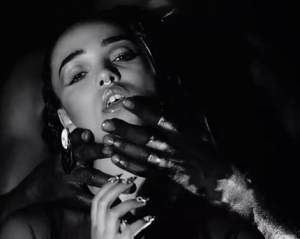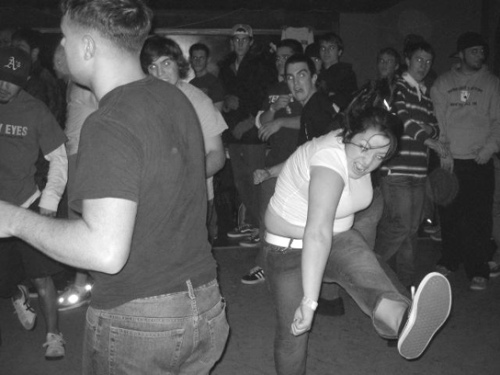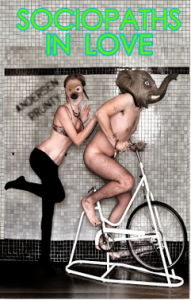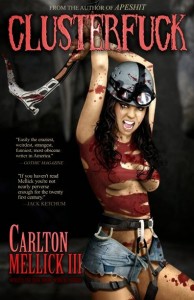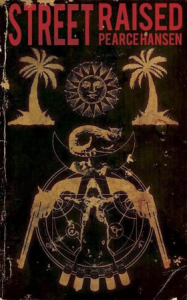8 Ways to Make Book Readings Awesome

Honestly, I love books more than money, sex, or bourbon. But book readings are often a pretty lame way to spend an evening. They’re pompous, silly, poorly planned, and excruciatingly dull. They accomplish nothing. And the majority of people who come to book readings have already read the book so it’s not even like they’re good marketing ploys.
Reader-friends, it doesn’t have to be this way! Books are awesome, most authors are engaging, intelligent people, and bookstores are certainly the fun places we all love. Therefore, let’s bring our noggins together and think up a bunch of ways to turn these indomitably boring events into lively festivals of literary hoopla and excitement. Let me start us off with 8 suggestions:
#1. No introductions – This will cut down the pomp by a solid 50%. No blathering adulations or list of prizes. Just say the author’s name, a book title or two, and get the show on the road.
#2. Don’t let the author sit down – Get kinetic, Orhan Pamuk! Let’s move it, Lydia Davis! Shake that money-maker a tad Marilynn Robinson! Give us some energy and zest. Do a little hula and shimmy shimmy. No chair, no podium, no hammock or beanbag contraption to rest your writerly body on. Instead move around and hell, if the energy sags, do what the jazz musicians do and improvise a sentence or two.
#3. Shout “BAM” before turning each page – “The instant her voice broke off, ceasing to compel my attention, my belief, I felt the basic insincerity of what she—BAM!!!—had said. It made me uneasy, as though the whole evening had been a trick of some sort to exact a contributory emotion from me.” That’s right, read it, Fitzgerald!
#5. Gesticulate rabidly, do 10 minutes of reading max, and if the reading gets boring accept the occasional heckle – “Hey Cheever, you suck tattersal cock!”
#6. End by telling us a local anecdote, good bookstore memory, or about your literary arch-nemesis – This will help personalize the event. A little showmanship goes a long way in creating a compelling public experience.
#7. Don’t let that person in the audience ask questions – This is BY FAR the most important suggestion because you know EXACTLY who I mean. We can’t let this person hijack the show. Have courage, bookstore employees! Even if the question-asker is a regular who always buys hardcover, tell them the gag order’s in effect for the common good of everyone else. We thank you greatly.
#8. Serve booze or juice and light snacks afterward – It’s why people love art events, the free wine and Triscuits. Somebody could take a dump on the floor of his sublet and so long as there was two-buck chuck, Cheese Nips, and a trendy promotional flyer loads of people would come to view it. Food equals turn out. Turn out equals energy and press. Also, free Ritz crackers and tiny paper cups of wine will get people to stick around and probably buy the author’s journeyman collection of short stories.
Now these suggestions are just Part 1. Part 2 involves more excitement and maybe violence. We need to take dramatic steps to invigorate today’s literary players so they’ll create engaging personae, which will outlive them. We need a new flock of writers to replace the likes of Norman Mailer, Lillian Hellman, Gore Vidal, and Hunter S. Thompson.
At AWP this year, the coordinators should host off-site events to keep everybody on their toes. Perhaps a charity boxing match between Colson Whitehead and Richard Ford. Or a street rumble between people who like prose poems and the rest of the world. Somebody can take a folding chair to Gary Shteyngart’s face WWF style. I’d pay money to see that. Violence and fiendishness are, weirdly enough, sometimes useful shortcuts to developing literary personae. Let’s make this thing memorable. BAM!!
***
Alex Kalamaroff is a 26-year-old writer living in Boston. He works on the administrative team of a Boston Public Schools high school. You can read his other writings here or follow him on twitter @alexkalamaroff.
WTF Is Happening In My Shower?
Inspired by Adam Robinson’s exegesis of his own shower (pleasure dome) and Melissa Broder’s shower (chant silo) peek-a-boo, here’s my shower: READ MORE >
oops!…i did it again: i cant remember to forget you (FKA MEANINGFUL)
I. Two Days After Whateverdaythegrammystookplacethisyear
I was taking about sex with a new person when I said I was annoyed choking is not on the table as an option. Then I said my ex’s name and remembered how she loved it.
“Oh, I know,” came his Freudian drip. I then punched him pretty hard on his arm, but without being violent. I was kind of upset, but I also knew he didn’t mean to hurt me, his tongue just worked faster than his brain in that moment.
The weird thing is, Billy was probably the victim in all of this. During a time we were trying to be over I surrounded myself with friends who weren’t shared, friends who didn’t let me respond to her manic pleas for reciprocity. So I saw the blocks of texts arrive, and I ignored them, but not because I wanted to ignore them. I was still forcing myself to not respond. That’s when it happened. I know because we eventually got back together and she never told me. But one day I went through her phone and saw her bragging texts about Billy and how he fucks like a rabbit and how the best part of it was that Billy was my good friend. She was bragging about it, but how unfortunate was that? She, who I successfully ignored, intentionally turned to someone else to hurt me for ignoring her. “Positional play is the maneuvering of opponents into the forced clarification of their (but not your) tactical lines of action,” and that was what she was doing. But we all got played in the end, thankfully including her.
Sometimes we do things for unclear reasons. Maybe because they feel good. Is that a reason? I think so, especially when I do the things. Is it worse when the sex is perfect with an idiot or when the sex is boring with a genius? I dunno, but I hope to have less of it and try to make it meaningful.
There is this mix I was listening to recently and it is very good, but I have a problem with it: it closes with a juxtaposition of Justin Timberlake’s “Cry Me A River” and Britney Spears’ “Everytime.” Hopefully, I need not clarify why that poses a problem, but if I must let me say I have a problem with myself for feeling sorry for Britney, when she was the one doing things for unclear reasons because they felt good. “This song is my sorry,” is a fucked up lyric to be used in a pop song when it is truly personal, and in Spears’ case at that time it was. [1]
You might remember my friend “Billy?” You probably don’t, so here. We grabbed lunch together last week, it was pretty fun. We got Ramen and talked about stuff on a broad scale: the things we are doing for money, the people we have been getting naked with and, naturally, cultural ephemera. An ephemeron we addressed for example was the Grammys ceremony and how we felt about some of the performances and awards. Of course neither of us was able to watch past the first half, or perhaps nothing of note happened in that half. We shall never know!
What we do know: Billy is dating someone seriously, and she is taking him a lot more seriously than he is her. She is “intense” and “confrontational.” She senses what they both know. Basically what he is saying is that he is not up for it. He likes her, but she feels for him in ways he doesn’t. I tell Billy to tell her that he knows her intuition is right. To stop playing along and pretending he doesn’t see what she is right to notice their “thing” is missing.
Must we pass over in silence what we cannot speak about?
II. Whateverdaythegrammystookplacethisyear
THE *REAL* GRAMMYS, HAPPENING EONS BEFORE THE SUPERBOWL
I watched them with my friend who will not be told when she must cease thinking about Beyonce’s net shorts. (“i hate how everything moves so quickly. it’s like just because a few days have passed doesn’t mean i’m not still thinking about the grammys. sure, not MOST of the grammys. but i’ll be thinking about her netted costume for a WHILE. why does the internet want everyone’s brains on fast forward?”)
I could not believe how fortunate it was that I happened to be near a television! I was casually complaining about life to a dear friend on a Whateverdaythegrammystookplacethisyear when all of a sudden… Beyonce! I never fully get how award shows work, their purpose and how the selection process works for who gets nominated for what. But if they start with Beyonce, I am totally mesmerized and willing to watch with full attention and the occasional loud “OH MY BEYONCEEE!” There were multiple of those, and people on the receiving end of Beyonce’s electric chair were electrified, as expected, jumping up and down their couches everywhere, unless they lived on the West Coast, and thus were penalized for their decision .
The *Real* Grammys seem to be organized by a panel of Ladies… who Love Cool J. Why is he the presenter? Why do they keep Doin’ It (feat Leshaun)? The sartorial negligence of the Cool James was apparent as he momentarily shared a stage with an immaculately dressed First Husband of America. Let’s just say there were no ZZZs in Jay-Z’s perfect outfit, and even less ZZZs were there to be found in the way the Presidential couple looked like while performing together during the *Real* Grammys, intoxicating everyone with their intoxication.
The deep blue sea of sartorial hmmms deepened further when our favorite Neptune decided to hide his crown under a hat, and all of humanity wondered: “Pharrell. Why!” He was still perfect, and at least wasn’t being ridiculous like those dudes who must have been sweating balls in their anonymity protecting helmets.
But looks and looking supa dupa fly are not all that matters in music these days. The young musicians have set up the bar mad high, where only Lordes can fly, and your prepackaged Dark Unicorn won’t fly you there despite its hypnotic beat (gah, this hasn’t happened to my brain (?) since when Gwen Stefani was cheerleading) that encourages obsessive repeat-play.
If the producers of your album aren’t Illuminati, you might have to join a circus. In the words of pop-princess (does she keep being princess until Madonna dies?) Britney Spears: “There’s only two types of people in the world: the ones that entertain, and the ones that observe.” Pink misunderstood the distinction and thought being observed was synonymous to entertaining, but acrobatics are all the ZZZs Jay-Z was missing that night. Except for her thigh strength, which so wow, very anti-ZZZ!
[*serious-y chunk*]
Anyway, time to get serious-y. Let’s address the thing that agitated most of us about the *Real* Grammys: Kendrick Lamar—who was, is and will always be objectively the best in everything for which he was nominated—didn’t win anything. Then the band (is Macklemore a band? or just that dude with the two-year old Freeman’s Alley barbershop hair a solo thing?) made the crass, gross error of trying to recognized their (his?) inferiority by sharing the thought with all their fans. This literally felt like a violent slap to everyone: (1) the people who might have thought Mackleduders deserved to win stuff, (2) the people who wanted Kendrick to win stuff and were frustrated he didn’t, and (3) let’s not even think about all the other very sensitive and insecure artists who were both nominated and lost and not even publicly recognized by the true winner of stuff they lost as the ones worthy of winning.
To think this band (or dude? I really have to find out at this point!) would even consider considering publicly sharing a private message he sent which should have been private, because eww band or dude, get a publicist! The negative criticism they (or “he,” whichever is correct!) have received is totally deserved. Bad apologies are in poorer taste than not apologizing at all, and this one was a very selfish and self-aggrandizing one. The reason this “apology” really sucked was the way it was portrayed and whored out via social media. There is a Kendrick song called “Real.” It is greatly introspective and reflective, further showing where in the “real nigga” doctrine Kendrick falls: he is not obsessed with appearances in a way consuming his music’s production.
The song stresses the importance of showing up, of being “real” in a way that is vulnerable:
The reason why I know you very well/ cause we have the same eyes can’t you tell?/ the days I tried to cover up and conceal/ my pride, it only made it harder for me to deal
[*end of serious-y chunk*]
Speaking of #Unapologetic, sources close to the Barbadian queen of pop Rihanna have revealed to TMZ the star watched the show at the comfort of a new planet she recently purchased. While she is considering Stay-ing there a while, TMZ has learned that Rihanna used telepathy to support her bestie (hmm. Cara?) close friend Katy Perry during her Grammys performance. “Where have you been?” thought Katy in the secret illuminati witchlanguage she shared with Rih, and then she felt the transcendental high-five from afar.
Then everyone bought things and companies were so, so happy! Well, almost everyone bought things. Mostly women who wanted to wear all the beauty products that made their stars look like stars. Men would have to wait for a sports event, like last year’s Beyonce performance at the sports thing which made Janet Jackson a star.
In conclusion, the *Real* Grammys didn’t really change anything, but that’s okay. Because the Grammys rarely do that. It is mostly public opinion that shapes who the big figures are in culture, and all the individuals who are nominated for these awards have acquired a level of respect as artists significant enough to see Taylor Swift going hard to Kendrick live, which is fine and great and super, but remains besides the point. When our cultural curators shift our attention to something silly, even if this silly something is endearing and well-intentioned, they (the curators) have taken our attention away from something else.
Who chose the direction to focus on Swift—and more extensively—before showing us an enthusiastic Hova? Probably the same exact person who gave Macklemore the award. It wasn’t me. But if it were me directing, I would have focused on the performance exclusively, out of respect to the person on stage. If a majority of the population only likes stuff because other people like it, then please save the stuff I like from getting Grammys!
III Nine Days After Whateverdaythegrammystookplacethisyear
He felt sad, he said. It was the morning after he stopped hating himself for being kinda in the gray area for so long in private. The night before he had send me a text: “It’s over. A little back and forth but we both agreed it was checkmate. Broke up in Central Park, lol. It went so well/ was our first real convo. Probably the best convo we ve ever had. I feel surprisingly sad.”
I was really proud of him. And of me, for challenging him to be upfront about his lack of genuine want in his relationship. But I also felt meaningless. I wasn’t even able to arise in my person the decency Billy was finally able to come up with for his new ex.
Whereof one cannot speak, thereof one must be silent, I guess.
NOTES
[1] I know this with certainty, because this was the first song Spears wrote. She wrote it with a woman named Artani, who then went on a Greek reality-talent show, called “Fame Story,” which everyone in Greece watched at the time because we were trying to not focus on our faltering institutions as a nation.
Artani was dealing with a breakup while Britney was trying to face the new Justin Timberlake as an ex, who had released “Cry Me A River.” The song was personal, and “Everytime” was a vulnerable response to it, but how vulnerable was it really, when it was a pop song and it was created for everyone? Doesn’t that take away from it in serving a purpose as being a meaningful apology? I think it did/ does/ forever will.
Sportin’ Jack by Paul Strohm 28.5 Points
- Shattered clock of memoir flashes. Thinking Abigail Thomas, John Edgar Wideman (in Harper’s or some mag like Harper’s a while back), Baudelaire, Between Parentheses, fuck I don’t know. Calling for flash nonfiction collection authors.
- The cover has a guy holding tiny baby chicks, as you can surmise. The chicks look like clay or bewildered paper balls.
- The real angling or net fishing is memory.
- Can you recall 5 stories from when you were age 10, maybe 5 interactions with dogs? Neither can I. Where did they collapse?
- Every flash, all 100, is 100 words. That’s called a drabble in fiction. Not exactly Oulipo but it has an effect, like a painting of a vulture in a mirror. Aesthetic restraints lead to increased creativity (and technique), not decreased. Perec taught us the wanderer can own the wall.
- Language leads on like a forehead, and seems to fulfill at time, the writer.
- I sense a cobweb fatigue with pretentiousness. You can feel a jacket being shucked and thrown crumpled to the floor.
- Writer asks, wonders, “Who was this Jack?”
- Shame, for example. A drowsing duck inside the chest cavity.
- My favorite line: I was wooing a Kansas City woman. Very Chinquee, in its direct way.
- I also enjoyed, “She died from alcohol, but nobody ever saw her take a drink.” READ MORE >
January 28th, 2014 / 3:46 pm
10 Reasons Why The Knicks J.R. Smith Is Like The Novelist Norman Mailer
My favorite NBA player, Larry Johnson, had a gold front tooth, yelled at the ball during free throws, once told an interviewer that his diet consisted of soda and candy (imagine reading this as a teenager) and had a series of TV commercials where he transformed into his alter-ego: a gray-wig wearing, puffy flower dress clad, narrow vintage glasses wearing, “Grandmama.” I fondly remember wearing his replica jersey (the very first of these ever for sale) several sizes too large, more dress than jersey.
Interview with the editors of CATCH UP Magazine
The editors of Catch Up were kind enough to answer a few of my questions about their badass journal.
How did Catch Up emerge?
Jeff: In the early 2000’s, William Cardini and I founded the artist collective The Gold County Paper Mill. Together with our pal Chuch, we produced comics, zines, and weirdo DVDs. But in 2008, I moved with my wife from Austin to Louisville, which meant the performance art we were making together would become fairly impossible. Catch Up started as a way to continue the collaborative projects that WIlliam, Chuch and I had grown to love.
Catch Up was intended to be an object-based series of collaborations put out by the GCPM. The “first issue” was a t-shirt. That idea fizzled out quickly. Having enjoyed producing our own books, we decided to try our hand at publishing others. Will is a cartoonist and I’m a poet, so we just mushed those two things together.
Once in Louisville I met poet Adam Day and designer Rob Bozwell, who both quickly joined the team. Will enlisted the help of another frequent collaborator of his, Josh Burggraf. The five of us turned Catch Up into the fucking dope journal it is today.
After a few more shake ups, moves, marriages and babies, Catch Up is now run by myself, Hannah Gamble, Gary Jackson, Peter Jurmu, Pete Toms and PB Kain.
What is your VIDA count?
Summary of the National Book Critics Awards Finalists for Publishing Year 2013
In case you missed it, the NBCC announced their newest awards finalists. According to their selections, the only publishers publishing award-worthy material are FSG and Knopf, plus a meager handful of others that are not FSG or Knopf. Obviously the NBCC committee has never seen this list. The number of presses that aren’t FSG or Knopf would blow their minds!
AUTOBIOGRAPHY
(Knopf)
(Farrar, Straus & Giroux)
(Viking)
(Bloomsbury)
(Simon & Schuster)
BIOGRAPHY
(Doubleday)
(Yale University Press)
(Knopf)
(Farrar, Straus & Giroux)
(Cornell University Press)
CRITICISM
(McSweeney’s)
(Liveright)
(Farrar, Straus & Giroux)
(Farrar, Straus & Giroux)
(Verso)
FICTION
(Knopf)
(Farrar, Straus & Giroux)
(Knopf)
(Viking)
(Little, Brown)
NONFICTION
(Norton)
(Crown)
(Sarah Crichton Books/Farrar, Straus & Giroux)
(Farrar, Straus & Giroux)
(Knopf)
POETRY
(Farrar, Straus & Giroux)
(Knopf)
(University of Pittsburgh Press)
(Copper Canyon)
(University of Arizona Press)
Prompted by Lily Hoang’s ‘On the Limits of Empathy, or, the Universality of Grief’
What struck me immediately after my dad died is that the grief I felt seemed simultaneously the most and the least unique feeling in the world: in its singularity no one could understand it; yet in its universality, to some extent, everyone could. I was comforted by this; by this sense that millions and millions of people have been in this situation and got through it. Time rolls on.
I find it interesting that in the therapy I’ve had since he died uniqueness and originality are subjects I’ve returned to again and again. Primarily, it has to be said, I’ve spoken about these subjects in terms of disappointment at realising that aspects of my personality I’d always thought were just completely my own are not really, after all, so unique. I don’t know what it might mean; perhaps it’s some sort of accounting I’m carrying out: what’s me; what was him etc? Perhaps, as well, I may just have sublimated the wanting of an original grief; that desire then emerging in another form? I find a possibility of truth in that. I realise I have a problem with grief: I feel guilty about indulging it. My dad dying was the terrible thing and that anything else might come close to causing me an equivalent level of pain – I mean even my grief over him dying – feels like something awfully hard to accept.
Last Thursday it was exactly four months since he died. I went to work; I sat at my desk; I talked to my colleagues; and I checked Facebook and my Gmail. I left at half five for an appointment with my therapist. The beginning of the week I’d felt very focussed on the coming Thursday; I’d expected it to be a tough day. As it turned out, for the biggest part of the day, it wasn’t tough at all. After seeing my therapist though things seemed totally to fall apart. I don’t know how to describe what happened other than to refer to those times a person feels hyper: a lot of energy; and, I guess, a kind of excitement at the things you might be able to do whilst in this mood; with it only slowly dawning on you that this excitement is a waste of time as this energy is directionless and impossible to focus. Well I had kind of the opposite of all that. There seemed to be a hyper-ness about how I felt, sure; yet instead of excitement featuring it absolutely was a down mood. And even now, two days later, I still don’t feel certain what happened: either I’d accessed something I’d tried to deny or I’d given one thing the name of something else out of a sense of dutifulness or, perhaps, a mixture of the two.
I wanted to tell my friend on Thursday about the significance of the day. I didn’t though. I wanted to tell it just as news but I was concerned, rather, it might come out as some kind of plea for sympathy. I’m not in a position yet to be able to assess the rights and wrongs of this.
This time last year I was involved in a brief relationship with a woman I’d met, in all places, via Facebook Scrabble games. I’d been playing online Scrabble for months – not in the hope of meeting anyone; just because I liked Scrabble – and opponents always seemed to be from London or Australia or somewhere; anyway, places very far away from where I live; this woman was from Stockport – just round the corner, effectively. Anyway, her dad had died some years earlier and she missed him very much; and she got it into her head that she wanted to meet my dad. As time passed this seemed to become more and more of a preoccupation for her; yet, it began to seem to me, more a kind of theoretical preoccupation than an actual one. What I mean is she liked to discuss meeting my dad yet never wanted to make any actual plans to that end. So the meeting never happened. She would always ask though, often even before she’d asked how I was, if my dad was okay. Since he died I’ve wondered on several occasions if I should get back in touch with this woman to let her know about my dad. I haven’t though. I think the occasions when I do consider this are times when I very much do want sympathy – and not necessarily perhaps for reasons connected to my dad. To use his death then as a means of acquiring that sympathy would feel very wrong to me.
Empathy is possible, absolutely. Regarding this idea of ‘genuine empathy’, well, if ‘genuine empathy’ is only possible between like and like I reckon it’s an idea that’s better off ditched. A person can understand and share another person’s feelings, sure; of course though they can’t access those same feelings in their particularity and uniqueness. Over these past four months I’ve been hugely grateful for the support of family and friends.
Since he died I have cried loads. The most recent time being last night at the thought of sorting through his clothes which I knew I’d be doing today. So far I haven’t cried today.
Tonight I will drink two cans of lager. Two because it’s that there are only two in the fridge. In the days and weeks following his death I drank loads and I drank all manner of stuff. The main reason for my drinking was, I think, because I just didn’t want to be at home – the home I’d lived in all my life with my dad. Drinking took me to the pub. It put me amongst people – alright, most of the time not people I was talking to (generally I’d be in the pub alone with just a book for company); it made that period between getting into bed and falling asleep last probably just minutes; drinking had a lot going for it. Today, mentioning to my aunt about the two cans I’d had last night as well, I realised something had changed: recently I’ve been drinking less.
About a month after my dad died the mothers of two friends at work died. Then the month after that the mother of a third friend died as well. I don’t think there were sky high expectations of me being able to prove particularly empathetic given what I was going through myself; and that was perhaps fortunate for me. Mike said to me though that people he would have expected a lot from at that time had, he felt, let him down; whereas people he didn’t expect so much from had really delivered. The reason for me saying this – I assume it’s clear – is that he felt I’d delivered. He meant, I think, I’d said stuff to him which was appropriate and which was useful. I’d found that easy to do though. As I said to him, perhaps I knew what to say because I’d so recently gone through this stuff myself. And that easiness is something I just don’t trust. It feels like due to it being so easy for me to know what to say what I said can’t have meant too much. Really, I mean, how useful are words? And I feel my sense of their uselessness takes something away from them even as I’m saying them. Still though, at such times words are often all we have to give.
How do we learn about death? We can learn about it from books, sure; but from books we’ll only take the generalities. Death in its horrible particularity is something we can only begin to learn about as we see those around us we love die.
***
Richard Barrett lives and works in Salford, UK. His poetry collections are Pig Fervour (Arthur Shilling Press, 2009); Sidings (White Leaf Press, 2010); A Big Apple (Knives Forks and Spoons, 2011); # (zimZalla, 2011); The Shangri Las (erbacce, 2013); with, forthcoming, Free (Blart Books, 2014). His work has been widely anthologized; most recently in Philip Davenport’s The Dark Would. He is a co-organiser of the Manchester based reading series Peter Barlow’s Cigarette.
Best Covers of 2013
As 2013 came to an end, everyone made lists of the best books of the year. Sadly, most of the lists published in popular sites (again, I said most, not all) focused on whatever came from the Big Five during the year and left out the gems that came from indie presses. Then the same thing happened with covers. I read/saw best lists covers at places like Flavorwire and The New York Times, and none of my favorite covers were there. Sure, there were a few good ones, but most were unoriginal, unbalanced, mediocre, etc. You know, fake ripped paper, bad photography, a few birds. I held a lot of covers in 2013, and most came from indie presses, so I decided to make my own list of best covers. Here they are in no particular order.
Sociopaths in Love by Andersen Prunty. The cover image by Dorothy Bhawl is great. Plus, a naked man riding an old stationary bike while wearing an elephant mask has to be on any cover list you make. Grindhouse Press publishes outré literature, and their covers let you know what you’re getting into.
Bizarro superstar Carlton Mellick has made wise decisions throughout his career, and working with artist Ed Mironiuk is one of them. You don’t need to see Mellick’s name on a cover to know you’re looking at one of his book. As every year, Mellick released a few novels and they all had good covers. However, Clusterfuck gets the top spot because it reminds folks of Apeshit‘s cover, pays homage to all things 1980’s and gory, and because no one else out there has the guts to make underboob a recurring element in his or her cover art.
Michael J. Seidlinger is writing fantastic novels and editing/publishing top-notch literature over at Civil Coping Mechanisms. With whatever time he has left, he designs great covers. CCM covers are always different, and this year the best one was the cover for Heiko Julien’s I Am Ready to Die a Violent Death. It’s fun and wild and dirty, like a weekend in Vegas. Seidlinger is giving alt lit a look, and with the upcoming (June 2014) release of CCM’s 40 Likely to Die Before 40, and anthology co-edited by Seidlinger and Lazy Fascist’s editor Cameron Pierce and featuring work by Sam Pink, Scott McClanahan, Ana Carrete, Richard Chiem, Heiko Julien, Chelsea Martin, Megan Boyle, and many others, it looks like he will be doing it for a long time to come.
Chances are you haven’t heard of Dynatox Minitries yet. In 2014, you probably will. Author Jordan Krall started it as a project to publish limited edition books by neo-beat, neo-noir, horror, surreal, bizarre, and just plain weird authors he thought deserved a chance and weren’t getting one. It worked. Besides writing, editing, and publishing, Krall also does most of the covers, and some are as wild as the words inside. My favorite for 2013 is based on a painting by Krall and was designed for Randy Cunningham’s short story collection The Man With the Donald Sutherland Face.
It seems Two Dollar Radio is doing everything right these days, and covers are not the exception. I loved the image on the cover of Scott McClanahan’s Crapalachia, but the best one this year has to be Jeff Jackson’s Mira Corpora. The color is unique and the art is eye-catching with a touch of creepy. Also, kudos to artist Michael Salerno for proving that with enough talent and drive, great things can be done with something as simple as a Flickr image.
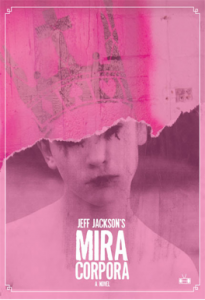
Reading those rigged lists everywhere was hard for many reasons, but not seeing a Matthew Revert cover anywhere was insulting. Revert, who besides an outstanding designer is one of the best authors out there and whose novel Basal Ganglia made my list of best reads of the year, is the go-to man when it comes to eye-catching covers. Broken River Books, Lazy Fascist Press, Copeland Valley Press, Grindhouse Press, Dark Coast Press, LegumeMan Books, Swallowdown Press, and Raw Dog Screaming Press are some of the outstanding indie presses that regularly turn to revert for the kind of designs that sell books. Remember that famous cover that resembled a whisky’s brand and made Patrick Wensink a viral sensation? That was a Revert cover. Have you seen those recent books by authors like Jedidiah Ayres and Stephen Graham Jones that made Broken River Books the best thing to happen to crime fiction in 2013? All of them had Revert covers. All of Revert’s work deserves to be on this list, but I’ll give you the one for Pearce Hansen’s Street Raised and suggest you check out the rest of his work on your own:
Gabino Iglesias is a writer, journalist, and book reviewer living in Austin, TX. He’s the author of Gutmouth (Eraserhead Press) and a few other things no one will ever read. His work has appeared in The New York Times, Verbicide, The Rumpus, HTMLGiant, The Magazine of Bizarro Fiction, Z Magazine, Out of the Gutter, Word Riot, and a other print and online venues. You can reach him at gabinoiglesias@gmail.com.
On the Limits of Empathy, or, the Universality of Grief
My sister died a year ago today. I would like to believe my grief is original, but it isn’t.
In “Plants and the Limits of Empathy,” Michael Marder argues that it is impossible for people to genuinely empathize with plants because we are too different. Any semblance of empathy is pure anthropomorphization.
To those who have not lost, they cannot empathize.
Make me human, darling, anthropomorphize me.

